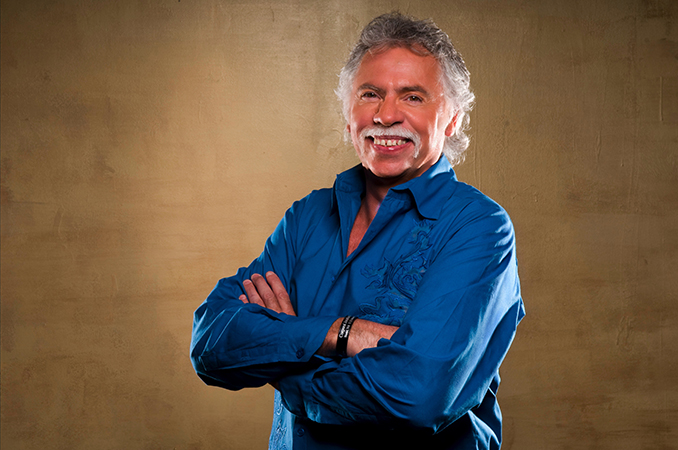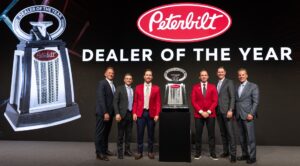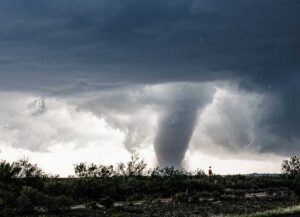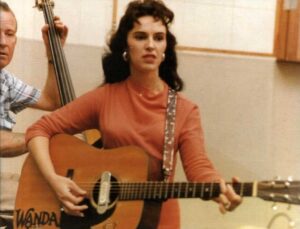“One thing about truck drivers is that they never change.”
Those are the words of Joe Bonsall, one of four members of The Oak Ridge Boys (ORB), a quartet approaching a half-century atop the country music world. Over the decades as they’ve toured America, the ORB have shared untold highway miles with professional truck drivers.
“Truckers are the same people they’ve always been. They have the same values. And every one you run into is solid red, white, and blue.” Bonsall’s description of truck drivers could just as easily apply to his own life.
The ORB are perhaps best known for their 1981 song “Elvira.” Featuring Bonsall’s tenor voice contrasted with Richard Sterban’s bass in the repeated solo, “giddy up ba-oom papa oom papa mow mow,” “Elvira” was certified platinum. For several years, the only other country recording earning the same level of sales was “Islands in the Stream,” sung by the late Kenny Rogers and Dolly Parton.
“When we recorded ‘Elvira,’ all of a sudden we went from being a big-name country act to a household name,” shared Bonsall. “It was so powerful and so huge. We were on every television show. We did ‘The Tonight Show’ 30 times. ‘Elvira’ was the number one country single from March until June 1981.”
Finding his way
Johnny Carson’s Los Angeles studio was a long road from the Kensington area of Philadelphia where Bonsall grew up with members of the “K & A Gang,” an organized crime gang working throughout the East Coast beginning in the 1950s.
“I actually knew some of those guys and some of the young guys who wanted to grow up to be [in the K & A Gang],” he said. “It was a tough neighborhood, but nothing like what the area is today.”
“In my neighborhood, you stood a pretty good chance every day of getting beat up or having to beat up somebody,” said Bonsall. “Today, some of the buildings have collapsed, and the drugs and hookers are present … it’s really sad.” Bonsall says he learned a lot growing up on the streets of a major American city. “I never, ever, ever, want to go back there. But I’m glad I was there.” Based on the experiences of his father four years before Joe was born, he was lucky to have been anywhere.
As Bonsall wrote in G.I. Joe and Lillie: Remembering a Life of Love and Loyalty, one of 10 books he’s authored, Joe Sr. stormed Omaha Beach in Normandy as a 19-year old Army private on D-Day. He beat the odds and survived the initial invasion only to be seriously injured in combat six weeks later. While hospitalized he met Lillie, a Women’s Army Corps nurse. Three days later, the two married, eventually settling in the neighborhood where they raised a family with Lillie caring for her husband after he suffered a disabling stroke at the age of just 35.
The loyalty, patriotism, and values Bonsall describes in his tribute to his parents have guided his life for 72 years.

Values: The red, white, and blue and Jesus
Bonsall wasn’t particularly religious as a youngster, but an unplanned trip to a live Southern Gospel quartet performance near his home had a profound impact on his future. In fact, looking back on “Elvira,” the song’s success allowed Bonsall to trade in his used Buick and buy a new Cadillac — “black with red interior” — an upgrade indirectly highlighting the day he was introduced to Southern Gospel.
“I only went to church off and on,” shared Bonsall. “But a lot of kids were involved in a youth organization called ‘Christian Endeavor.’ They were always trying to get me to do stuff, but I never wanted to bother with them. They were ‘vanilla.’ They weren’t cool.”
As “vanilla” as the youth organization seemed, one member attracted Bonsall, or rather, Bonsall was drawn to his car.
“This guy had a white ’61 Buick convertible,” said Bonsall. “It was just incredible — white with red interior, a top-down. The guy said, ‘A bunch of us are going out to the suburbs to hear a Southern Gospel quartet sing.’ Well, I wanted to ride in the Buick.”
Bonsall hopped in the car. Being in the right place at the right time led to his first “big-time live four-part harmony” experience. “It saved my life,” he said. “I knew that was what I wanted to do.” Four-part harmony may have attracted Bonsall to music, but it wasn’t long before the lyrics’ meaning struck a chord.
“I went with these kids to a youth camp, accepted Christ into my heart, and my whole life changed,” Bonsall said. “Instead of being a 10th grade hoodlum, I had a Bible study club with 235 members. I was making quartets out of every four guys.” He’s been following a similar road ever since.
“Look at me,” he said. “I’m almost 72 years old. I’m sticking to it. So, I guess I had an epiphany growing up, and I’m very thankful for it. If I’d taken that left turn, who knows where I’d have ended up?” Still, success in the music business followed a winding road. Soon after becoming hooked on Southern Gospel music, he met another young quartet singer who would become a major part of Bonsall’s life for what is now approaching 60 years.
Navigating a road to the top
Richard Sterban was a 20-year-old native of Camden, New Jersey, across the Delaware River and a few miles south of Bonsall’s Philadelphia neighborhood. Despite growing up so close to each other, Sterban and Bonsall led much different lives.
“Richard really grew up in church,” shared Bonsall. “He was always pretty strait-laced, and I met him when I was 15. He was singing bass with a group called the Eastman Quartet.
“When I met Richard, he was working at Gimbel’s men’s store in Northeast Philly,” said Bonsall. “I would go up there and follow him all around and talk about gospel quartets and maybe buy a shirt from him.” Over the next few years, Sterban sang with the Eastman and Keystone Quartets, the latter based in Buffalo, New York. When Bonsall was 19, the Keystones asked him to join the group.
“Richard and I sang together for six years before he joined The Stamps [Quartet] and went on to sing with Elvis [Presley],” added Bonsall. Bonsall then turned the Keystones into what he calls the “little Oak Ridge Boys.”
“I hired a band, and we were singing about Jesus with a rock and roll attitude,” he said. When the real Oak Ridge Boys called Bonsall to join them in 1973, he brought that “edge” along with him.
Arriving, but not at his final destination
“When I joined the Oaks, we were singing all gospel music,” shared Bonsall. “But in the next year or so, a lot of the people that ran gospel kind of turned on us.” It seemed the ORB didn’t fall into Southern Gospel’s long-held image of clean-cut quartets with short hair and matching outfits.
“The Oaks were the coolest act in gospel,” he quipped. “But we grew our hair long, we didn’t dress alike, and we hired a whole band instead of just a piano player. We were trying to advance in music the same time the gospel industry was [carrying] on. The Oaks were ready to move forward but gospel kept moving backward.”
Following “the gray years” as Bonsall calls the mid-1970s, when the group feared it might starve to death, in 1977, they recorded the album many consider the group’s crossover between gospel and country music, “Y’all Come Back Saloon.” “We were on our way then,” said Bonsall. “But before that, man, it was some tough sledding.”
Over the next three years, the ORB recorded five gold albums and had a dozen No. 1 hits on the way to three Country Music Association and Academy of Country Music Awards. In 1980, the ORB went on a 90-city tour with the late Kenny Rogers and Dottie West.
The view from the high seats
“Every seat sold out,” said Bonsall. “It was a big production with a big stage in the middle of the arena. We were the hottest young act in the business, and we just tore it up.” At the tour’s end, the ORB recorded “Elvira.”
“Those days were just amazing times. They were the type of heyday most acts would give their right arm for,” shared Bonsall. The aftermath of “Elvira” is country music history. That history includes many more hit records, membership in the Grand Ole Opry, and induction into the Country Music Hall of Fame. As for Bonsall, he is especially proud of his status as a member of the Philadelphia Music Hall of Fame.
Even as the ORB oldest members have reached the age of 80, Bonsall says they have no intention of slowing down. “We have 150 dates scheduled for 2020 (this interview was conducted prior to the COVID-19 crisis), and were setting up for 150 for 2021,” he said. And with his wife Mary Ann, two daughters, two granddaughters, a 350-acre farm, and a foundation dedicated to rescuing cats, Bonsall continues to juggle it all. The long road he’s traveled is only a bit shorter than it was when he joined the ORB, but Bonsall can’t see it ending. And the road continues to be filled with truck drivers, something Bonsall doesn’t see changing.
Truck-driver talk
Bonsall admits at one time he truly feared a group of truck drivers. “We pulled into this truck stop in Texas when ‘Y’all Come Back Saloon’ had just hit the charts,” he said. “We were so excited to see our record in the jukebox we sat at the counter and kept putting quarters in and playing the song over and over. The truckers were looking at us like we were a bunch of long-haired hippies,” he said. “It’s a wonder we didn’t get hit with a tire iron.” Things have changed since that early experience with truck drivers.
“We never stop at a truck stop, fuel up, and go,” he shared. “We like to hang around, buy stuff, and fellowship with the truckers. When they recognize us, truckers make a big fuss.” In Bonsall’s mind, it’s the truck drivers who deserve the attention.
“Truckers move our country,” he said. “These guys are the backbone of the nation.” And, as Bonsall commented at the outset of our interview, “Truckers never change.”
“Back when we traveled in one bus, we broke down in New Mexico,” said Bonsall. “A group of truck drivers took us to a place we could stay while the bus got fixed. They’re like that everywhere. I’ve been seeing it for decades and decades. Truck drivers today are the same as they always have been.”
Bonsall doesn’t know what the future holds for the ORB or himself. But considering the many miles the group has put on multiple tour buses, he’s learned one thing about the future — “That’s one of those things down the road.”
Since retiring from a career as an outdoor recreation professional from the State of Arkansas, Kris Rutherford has worked as a freelance writer and, with his wife, owns and publishes a small Northeast Texas newspaper, The Roxton Progress. Kris has worked as a ghostwriter and editor and has authored seven books of his own. He became interested in the trucking industry as a child in the 1970s when his family traveled the interstates twice a year between their home in Maine and their native Texas. He has been a classic country music enthusiast since the age of nine when he developed a special interest in trucking songs.









This was an awesome interview!!
I was fortunate enough to be at a concert with the Oak Ridge Boys and purchased “G. I. Joe and Lillie” for my mother’s 85th birthday. The Oak Ridge Boys had already boarded their bus for departure, but I managed to get somebody to go and take my book to Joe and he signed it for my mother!! My Mama was thrilled with her surprise!! After she had read it, she told me there is not enough money in the world for somebody to buy that book from her. Like Joe’s parents, my Daddy was in the service, the Air Force, and my Mama also worked on the airplanes!! She loved it….and we both LOVE the Oak Ridge Boys!! Sadly, I have never had a chance to tell Joe Bonsall how much I appreciated him signing Mama’s book that night. Hopefully he will see this and know how much it meant to us. ♥️♥️♥️♥️
I have been a fan for years. y favorite thing about Joe .is his going from one side of the stage to the other side. it would do no good to put gorilla glue on his shoes because he can’t stand still. I pray for you and Mary. and all the oaks God bless each one of you.